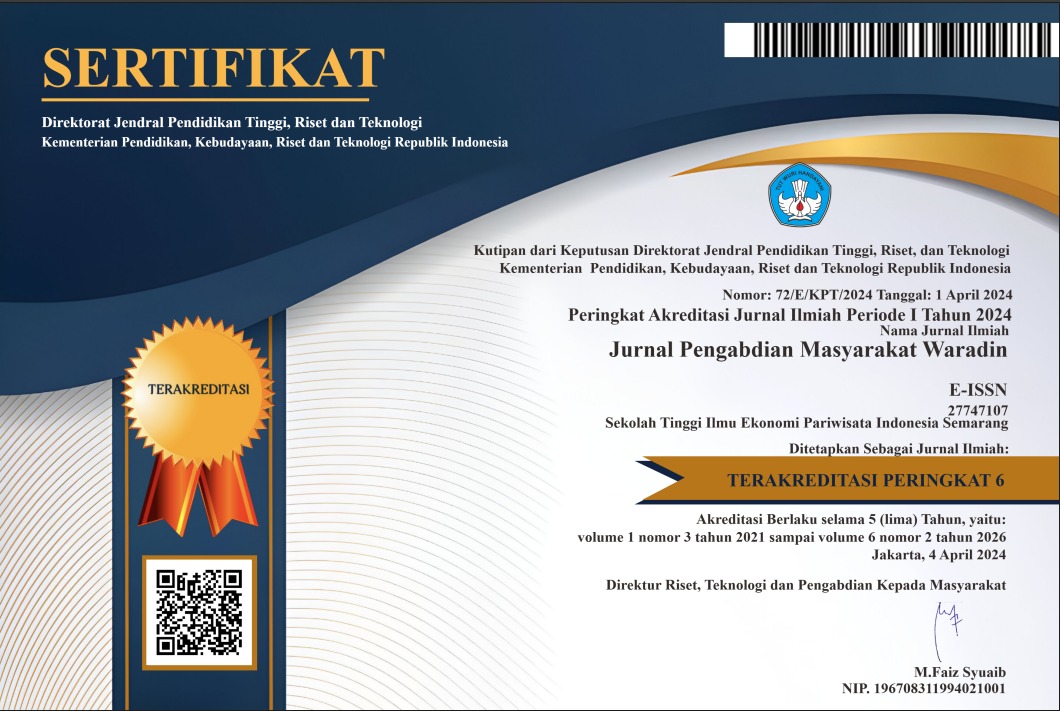Penerapan Sistem Hidroponik sebagai Upaya Mendorong Pertanian Berkelanjutan bagi Warga Kelurahan Nginden Jangkungan
DOI:
https://doi.org/10.56910/wrd.v4i3.384Keywords:
Hydroponics, Land Scarcity, Sustainable AgricultureAbstract
Land scarcity in urban areas encourages people to look for efficient alternatives to plant cultivation. Hydroponics, as a soil-free cultivation technique, offers a potential solution. This activity aims to carry out socialization and training on hydroponics to improve knowledge and skills in independent plant cultivation that can support household food security in urban communities. The method used was socialization and hands-on practice of making simple hydroponic systems. The results of the socialization and training showed a significant increase in participants' knowledge of the principles of hydroponics. The evaluation percentage is 78% of residents of Nginden Jangkungan sub-district, Sukolilo sub-district, Surabaya city are able to independently apply the Hydroponic system in the yard of each house and can take economic benefits from farming through the hydroponic system, but in the application of this hydroponic system requires high production costs, so that people pay more attention to the use of input allocations used to get more added value. Hydroponics is one of the sustainable agricultural efforts in urban environments that have limited land with the introduction of hydroponic systems, socialization, and application practices in urban areas that have been implemented.
References
Food and Agriculture Organization (FAO). (2008). Urban agriculture for sustainable poverty alleviation and food security. 84p.
Harya, G. I. (2019). Analisis profil kemiskinan makro Kabupaten Mojokerto. Jurnal Ilmiah Sosio Agribis, 19(1), 1–17. https://doi.org/10.30742/jisa1912019684
Harya, G. I. (2020). Penyusunan indeks pembangunan manusia kecamatan dan kabupaten Bojonegoro. Jurnal Ilmiah Sosio Agribis, 20(2), 48–66. https://doi.org/10.30742/jisa20220201223
Harya, G. I. (2021). Rencana aksi daerah pengarusutamaan gender Kabupaten Pacitan. Jurnal Ilmiah Sosio Agribis, 18(2), 51–73.
Harya, G. I. (2024). Optimalisasi budidaya melon dengan sistem hidroponik drft (Dynamic Floating Technique). Jurnal Pemasaran Agribisnis, 6(3), 416–423.
Harya, G. I., & Wahyuningrum, W. (2023). Analisis kelayakan usahatani kunyit petani Desa Petiken yang tergabung dalam kelompok tani BPP Driyorejo Kabupaten Gresik. Jurnal Ilmiah Manajemen Agribisnis, 11(2), 112–120. https://doi.org/10.33005/jimaemagri.v11i2.17
Harya, G. I., Fadil, C., & Kusumastuti, E. (2023). Penguatan skill berwirausaha UMKM dengan implementasi strategi pemasaran digital melalui social media di Kelurahan Kepanjen Kidul Kota Blitar. Jurnal Pengabdian Cendikia, 2(9), 84–92. https://doi.org/10.5281/zenodo.10440678
Harya, G. I., Indah, P. N., Sudiyarto, Widayanti, S., & Pratiwi, L. F. L. (2019). Competitiveness and development perspective of processed cocoa industries in East Java. AIP Conference Proceedings, 2019(2018). https://doi.org/10.1063/1.5061855
Harya, G. I., Kuswanto, K., Asmara, R., Tarik, J. T., Maulidah, S., & Budiwitjaksono, G. S. (2023). Taking a deeper look at the priority of agricultural industry efficiency through the use data envelopment approach. Agroalimentaria, 29, 167–177. https://orcid.org/0000-0003-
Hidayat, S. I., Indah, P. N., Nurhayati, T., Harya, G. I., & Hendrarini, H. (2019). Satisfaction of the farming community towards the performance of agricultural extension service: A case study in Benjeng Subdistrict of Gresik Regency, Indonesia. Russian Journal of Agricultural and Socio-Economic Sciences, 92(8), 197–203. https://doi.org/10.18551/rjoas.2019-08.21
Hou, J. J., & Lawson, L. J. (2009). Greening cities, growing communities: Learning from Seattle’s urban community gardens. University of Washington Press.
Sa’diyah, K., Ramadhani, L., & Harya, G. I. (2024). Hazard analysis and critical control point (HACCP) pada rancangan produk minuman sari buah jeruk PT Zestful Drink Innovation. 1(1), 1–19.







